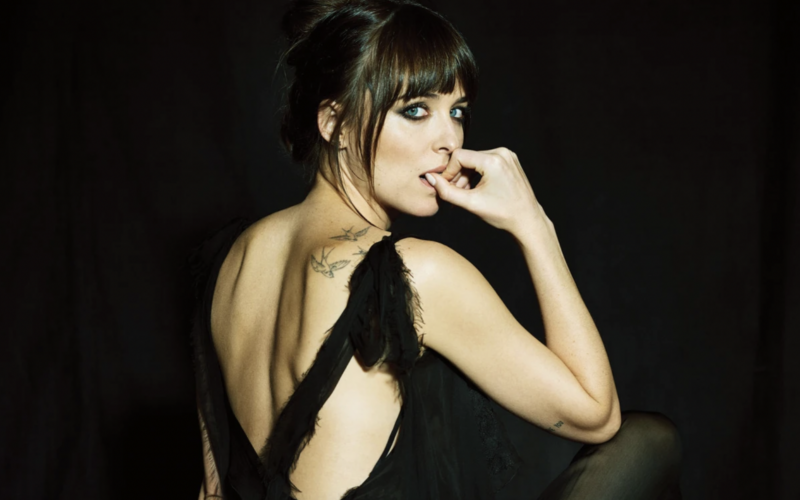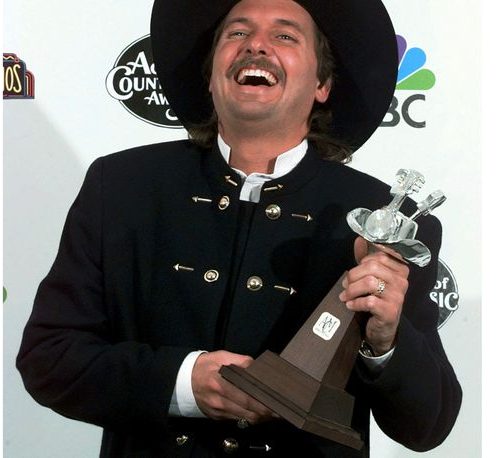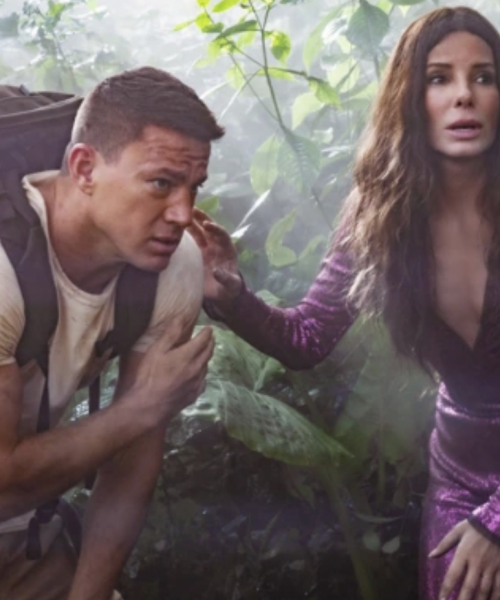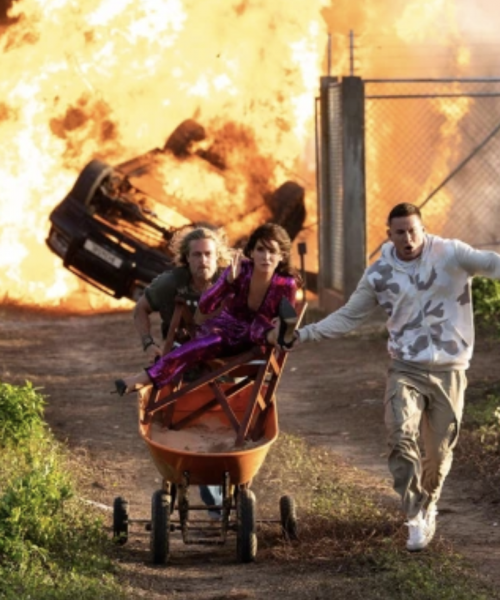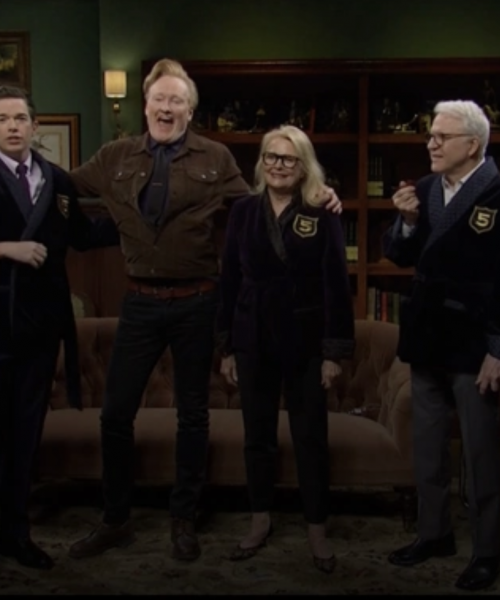BY TATIANA SIEGEL | HollywoodReporter.Com
Troy Warren for CNT #Entertainment
With four hot projects and a tabloid-trolled private life (with Coldplay’s Chris Martin), the actress takes her place in an A-list dynasty: “I’m grateful for my parents and my crazy life — the only reason I am the way I am is because of how I grew up.”
Dakota Johnson walks into the Tower Bar in West Hollywood, a location she picked and one that offers a juxtaposition of old Hollywood provenance (it was once Bugsy Siegel’s apartment) and new millennial chic. The same could be said for Johnson, who hails from Hollywood royalty as the daughter of Melanie Griffith and Don Johnson and granddaughter of Tippi Hedren, but who has a style and career approach all her own.
On this chilly October afternoon, Johnson has just come from her house in the Hollywood Hills that she bought in 2016 (she and her partner of four years, Coldplay frontman Chris Martin, recently moved into their shared Malibu estate once owned by Ryan Kavanaugh, but she’s using the Hollywood pad today to catch up on script reading and other work). She is sporting a lush green knit dress, red velvet Gucci purse and black leather jacket, a tattoo of the word “heaven” peeking out from under the sleeve. The ink is recent.
“I was thinking, ‘What if this life is heaven, and this is as good as it gets? Then what?’ ” she explains as she sips an iced coffee with almond milk. “Because during COVID, I started to feel pretty dark. It felt inspiring to embrace [that existential question] in a different way. And to be more aware of what I can do in each little minute to make things feel better for me and the people around me. And that’s truly just a choice. It’s just a decision.”
Before she made her way to our table on the terrace, she stopped to chat with her Fifty Shades of Greydirector Sam Taylor-Johnson and MGM movie chairman Michael De Luca, who produced the $1.3 billion film trilogy. The moment symbolizes the actress’ past, one that saw her prevail as Anastasia Steele in one of the more scrutinized casting processes in recent memory. But instead of parlaying Fifty Shades‘ success — it made history back in 2015 with the largest-ever opening for a female-directed feature — into a filmography focused on box office, Johnson opted for a different path.
“I think it’s really smart when actors who reach that level of ubiquity and could springboard into more conventional, mainstream success stay disciplined about working with quality directors,” says De Luca. “Dakota has been really smart about making sure she’s always aligned with quality directors. Then, everything’s at your disposal — commercial movies, interesting and provocative indie films. Now she can have it all.”
And refreshingly, while other actresses of her generation appear scripted when they plug their projects on TV, Johnson often offers a refreshing zero-fucks-to-give reprimand of the status quo. In an exchange with Ellen DeGeneres that went viral in 2019, the talk show host complained that she wasn’t invited to Johnson’s 30th birthday party. “Actually, no. That’s not the truth, Ellen. I did invite you and you didn’t come … ask everybody,” she said flatly. It was a move that Drew Barrymore was still praising two years later when Johnson appeared on her talk show, eliciting big laughs from the actress.
Johnson, 32, is literally Hollywood’s next generation and poised to have it all in a way that eclipses even her famous forbears, with the culmination of a slow-burning pivot that comes to fruition with four upcoming films she shot during the COVID-19 lockdown. First up is Venice International Film Festival breakout The Lost Daughter, which Netflix will release Dec. 31. Directed by Maggie Gyllenhaal and based on Elena Ferrante’s 2006 best-seller, Johnson gives a haunting performance as a young woman drowning in ambivalence about her role as a mother. But she wasn’t the obvious choice for Gyllenhaal.
Back in the fall of 2019, Johnson read Gyllenhaal’s script and set her mind to landing the role of Nina. “I hadn’t ever read women written like that,” she recalls. “Nina is struggling, she’s disappearing. To have this woman whose internal landscape is so different than what she’s projecting, that was really, really special. Because you see her, and no one is thinking about that girl’s mind. I am not a mother, but I know what it feels like to be scared or to be like, ‘Will I be a good mother?’ But for some reason, there’s this stigma around talking about that. And there’s a stigma around having just the thought of, ‘What if I walked out that fucking door? For a week or a minute for a cigarette.’ But you’re not supposed to say that out loud. Why? It’s so human and so relatable.”
The two women met for lunch at a small cafe in downtown Manhattan after Johnson reached out. Gyllenhaal, who had never seen the Fifty Shades movies, thought her ideas were compelling but had been skeptical about casting her — until sitting down with her.
“Within five minutes, we were talking about the most intimate, vulnerable parts of being ourselves, being women in the world and within. And that’s how Dakota is,” Gyllenhaal remembers. “I’ve never had any other experience with her. She’s just kind of not interested in anything except that kind of very intimate, real conversation. And I’m also up for that.”
In the film, Olivia Colman plays Leda, a yin to Nina’s yang as an older woman who has taken the reins of her life, even though it caused pain to herself and her family. Holding one’s own opposite an Oscar and Emmy winner like Colman is no easy task. As a result, Johnson finds herself in the awards-season conversation in the supporting actress race.
“She’s someone that I hope to never drift away from in my life,” Johnson says of Colman. “We were texting this morning, and she’s wonderful to be around all the time. This movie is really intense, but the minute we weren’t rolling, it was giggles and silliness and laughter. Every day after work, we would go swimming and have wine and dinner. I think part of the reason why there’s such an energy in this film is because it wasn’t like we were always in this twisted, fucked-up, depressing mindset. We were able to play. So we would go to these really extreme places within the scene. Then the minute we’d call ‘cut,’ Olivia and I are looking at furniture online and laughing and bullshit.”

The Lost Daughter is just one of the divergent films set to bow over the next year that offers 50 shades of Dakota. Also on the horizon is Carrie Cracknell’s interpretation of Persuasion, with Johnson as protagonist Anne Elliot, the most independent and arguably nuanced of all the Jane Austen heroines.
The previous year also found the actress tackling a new role entirely, that of producer. Two years ago, she launched TeaTime Pictures with former Netflix executive Ro Donnelly and quietly built a slate of some 25 projects, including two finished films, the Tig Notaro- and Stephanie Allynne- directed Am I OK? (the lesbian coming-out drama has been submitted to Sundance) and Cooper Raiff’s Cha Cha Real Smooth, which revolves around a mother and her autistic daughter.
Donnelly and Johnson, who are equally tattooed and look like sisters, met in 2016 through a mutual friend. Their projects are now set up all around town, including TV series Cult Following (Johnson will star alongside Riley Keough, her best friend since age 15) and Mad, Bad, and Dangerous to Know at MGM with De Luca (the film centers on an identical twin who tries to steal her sister’s “perfect” life).
“I think what drew us to each other was, we have this same taste that was very specific,” says Donnelly, a native of Ireland. “We have this bananas slate that is so exciting, because I believe she can do anything; I’ve seen it. I’ve seen her do take after take after take on set, and she’s the real deal. She’s a real artist, and so creative in every capacity that I feel we’ve only scratched the surface with what we’ve seen from her.”

As a child, there was no “aha” moment when Johnson realized her calling. “Acting was always — truly always — what I wanted to do,” she says. “Even when I was so little and I would be on set with my mom, it was a deep craving to do it. I wanted to look at everybody doing their jobs. I couldn’t get enough.”
In those formative years, she obsessively watched movies, the same one twice a day every day. First it was Mary Poppins and then The Wizard of Oz and then Home Alone. She can still go frame by frame and recount what everyone’s wearing and what their lines are. Griffith finally caved in to her 10-year-old daughter’s pleas and allowed her to play a small role in her then-husband Antonio Banderas’ Crazy in Alabama.
“I was playing my mom’s daughter, and my little sister [Stella Banderas] was in it as well. It was a family affair. But I took it very seriously,” Johnson says. “After that, I didn’t work until I was 18 or 19. If it were up to me, I would’ve left school. But my parents wanted me to finish, which was ironic because the first half of my life was traveling and never going to school and being with a tutor. I didn’t go to a full year of school until I was 11, and that was in San Francisco because my dad was filming Nash Bridges.”
There, she excelled academically but then was pulled out to move back to L.A. and enroll in yet another school. After that, there were four more schools. “Maybe it was destabilizing, but I never looked at it that way,” she says. “I was raised by lots of people, my mom and my dad and then stepparents and nannies and tutors and friends and teachers and then friends’ parents and boyfriends’ parents. I wanted to learn from everybody. And I still am like that. I’m grateful to my parents and my crazy life because the only reason I am the way I am is because of how I grew up. And that came with seeing some gnarly things as a kid, having to deal with adult content at a young age and also having a public life at times. But then also on the lighter side of that, things that were really beautiful and privileged and educational and the travel and the art and the artists. It was both: It was dark, dark, dark, dark, and it was light, light, bright lights.”
As for her parents’ edict to finish high school before pursuing acting, Johnson harbors no resentment. “I’m happy. I think it all goes as it’s supposed to.”

At the age of 18, she signed with manager Jason Weinberg. Next, she added WME agent Andrew Dunlap. In a Hollywood rarity, she remains with both to this day. (She’s also with the same publicist, Robin Baum, whom she’s known since she was 6 years old, when Baum was representing Griffith and Banderas.)
“I want to grow with people. I am not interested in stepping on people’s shoulders to get somewhere,” she says. “I care so much about trusting people and being trusted because this industry, it thrives on collaboration. You can’t do it by yourself.”
It didn’t take long before Johnson landed her first role as an adult in David Fincher’s The Social Network, which De Luca produced with Dana Brunetti. (The pair went on to produce the Fifty Shades trilogy.) “I remember Dana and I being blown away by just her brief appearance in The Social Network,” De Luca says. “Even in that one scene she has with Justin Timberlake, we thought she really was quite compelling. So having worked with her, we were talking about her for Fifty Shades. And just really having the whole weight of that franchise fall on her shoulders and making that character three-dimensional for it was pretty amazing.”
During her first Fifty Shades audition, she was asked to deliver a monologue from Ingmar Bergman’s Persona. She read the script and was excited by Taylor-Johnson’s vision of a stripped-down version of EL James’ book that harkened back to 9½ Weeks, Adrian Lyne’s 1986 cult erotic thriller.
“I couldn’t talk about it to anybody. Nobody in my family knew,” Johnson notes. “I was cast [and] I remember I spoke to Emily Blunt, and I was like, ‘Should I do this trilogy? Because I want to have a really special career, and I want to make a certain kind of film. And I know that this is going to change things.’ She was like, ‘Fucking do it if it feels right. Just do it. Always do what you want to do.’ “
Things did change, namely the script (multiple writers were brought in to bring it more in line with James’ erotic fantasy), and Taylor-Johnson inexplicably wasn’t brought back for the second film (the director battled creatively with James). Still, Johnson has no regrets.
“I feel like I haven’t been pigeonholed into anything [because of the role],” she says. “I guess I could have gone in a certain direction, but that’s just not what I was interested in.”
What did interest her was continuing to work with auteurs like Fincher and Taylor-Johnson. And her choices that followed Fifty Shades signaled that she prioritized quality over stardom. Call Me by Your Namedirector Luca Guadagnino became a champion in Johnson’s career when he cast her in his 2015 psychological drama A Bigger Splash. Guadagnino had been searching for an actress to play the film’s sultry 17-year-old pretending to be a 22-year-old, Penelope. An agent friend slipped him an early secret promo reel of Fifty Shades, and Guadagnino stopped in his tracks.

“I saw an element of mysteriousness and fierceness and also a beautiful kind of timeless and classic face, and an actress,” recalls Guadagnino, who then met with Johnson at his home in Italy. “I immediately was struck by her intelligence, her wicked humor, and all of those elements were exactly what I was looking for in Penelope but also in someone with whom I want to establish a strong relationship. She became one of my best friends.”
Guadagnino went on to develop the script for his 2018 supernatural horror remake Suspiria specifically for Johnson. “As an actress, I love the choices she’s making because she’s doing something very intelligent and holistic,” he adds. “She’s not looking for a character, period. She’s looking for a great character that can be at the same time part of a great project to be involved with.”
As the Fifty Shades trilogy played out, Johnson took smaller roles in films that featured top talent, like Scott Cooper’s 2015 Johnny Depp starrer Black Mass and 2019’s The Peanut Butter Falcon, opposite Shia LaBeouf, the latter a surprise indie hit that earned over $23 million worldwide. “I don’t pay attention to the noise,” says Johnson, who practices Transcendental Meditation daily. “I pay attention to if the script is great and the people involved are great.”
Some noise is impossible to block out. Like the power of the #MeToo movement and the clamor of cancel culture, which have swept through Hollywood in recent years and put so many of her former male co-stars, like Depp, LaBeouf and Armie Hammer, in jeopardy of never returning to the profession following abuse allegations and which, for some, allow no opportunity for redemption.
“I never experienced that firsthand from any of those people,” she says. “I had an incredible time working with them; I feel sad for the loss of great artists. I feel sad for people needing help and perhaps not getting it in time. I feel sad for anyone who was harmed or hurt. It’s just really sad. I do believe that people can change. I want to believe in the power of a human being to change and evolve and get help and help other people. I think there’s definitely a major overcorrection happening. But I do believe that there’s a way for the pendulum to find the middle. The way that studios have been run up until now, and still now, is behind. It is such an antiquated mindset of what movies should be made, who should be in them, how much people should get paid, what equality and diversity look like. Sometimes the old school needs to be moved out for the new school to come in. But, yeah, cancel culture is such a fucking downer. I hate that term.”

On this fall afternoon, Johnson is debating whether to catch an Eternals screening (“Chloé Zhao is a genius”) or keep a planned commitment with her mother. Family time has been scant during COVID. She spends as much time as possible with her grandmother, Hedren, and remains close to her extended tribe of half- and stepsiblings. “I didn’t see my dad for a long time because he lives in Montecito and is in his 70s, and we wanted to be safe,” she says. “I saw my mom a bit. It’s been weird. If I’ve been working, I can’t really be around my parents because they’re older. But my friends and my partner [Martin], we’ve been together a lot, and it’s great.”
Like any couple around the world, she and Martin have been watching Squid Game. “It is so intense,” she enthuses. “It’s confusingly fucked up because it’s joyful at moments and then it’s horrifying. And that’s a really interesting combo.”
Being at home offers Johnson the kind of anonymity that has been elusive since her Texas birth to two of Hollywood’s biggest stars of the ’80s. Now, as one half of a famed couple, she is hounded by paparazzi, even in the COVID era. “They have graduated to being sneaky, sneaky vermin into pests that you can see. They’re invisible germs. They’re like COVID, horrible and deadly,” she says. “They hide in cars. If you’re going to have that job, at least do it with some integrity. Get out of your car and take a picture. It’s really frightening to never know if you’re being photographed. It’s psycho. But then it’s like, ‘You chose this career, deal with it.’ But no, no one should have to deal with that. Luckily, I figured out ways to evade them, and I’m not giving away my secrets. But truly it takes a lot to have a private life.”
It’s something that author Elena Ferrante, which is a pseudonym, has managed to do despite global efforts to unmask his/her/their identity. Johnson says that Gyllenhaal has corresponded with Ferrante and received a blessing. Beyond that, no one knows anything about the brilliant mind behind The Lost Daughter. “The thing that is really cool is that she could be a woman. She could be a man. She could be two women. She could be a man and a woman, which totally turns this feminist gaze on its head.”

For now, Johnson is taking a break to enjoy the fruits of her productive lockdown before diving back into the grind. She and Donnelly have enough projects lined up to keep her busy through a next generational changing of the guard. She has an Amazon film in the works with Euphoria director Augustine Frizzell and is developing a book adaptation that would mark her feature directorial debut. Back in 2013, she appeared in the series finale of The Office, which was poised to set up a spinoff series that she would topline. It never came to be, which likely changed her trajectory.
“If everything else just falls away, maybe you’ll find me in that Office spinoff that no one wants to watch,” she says, laughing, before turning serious. “I don’t know in what world that would’ve worked for me creatively. I have found that when something is successful, even when there’s nothing left, they just keep trying to wring out the towel of story. Sometimes things need to end when they’re supposed to end.”


In Other NEWS


























